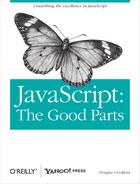We can compose objects out of sets of parts. For example, we can make a function
that can add simple event processing features to any object. It adds an on method, a fire
method, and a private event registry:
var eventuality = function (that) {
var registry = {};
that.fire = function (event) {
// Fire an event on an object. The event can be either
// a string containing the name of the event or an
// object containing a type property containing the
// name of the event. Handlers registered by the 'on'
// method that match the event name will be invoked.
var array,
func,
handler,
i,
type = typeof event === 'string' ? event : event.type;
// If an array of handlers exist for this event, then
// loop through it and execute the handlers in order.
if (registry.hasOwnProperty(type)) {
array = registry[type];
for (i = 0; i < array.length; i += 1) {
handler = array[i];
// A handler record contains a method and an optional
// array of parameters. If the method is a name, look
// up the function.
func = handler.method;
if (typeof func === 'string') {
func = this[func];
}
// Invoke a handler. If the record contained
// parameters, then pass them. Otherwise, pass the
// event object.
func.apply(this,
handler.parameters || [event]);
}
}
return this;
};
that.on = function (type, method, parameters) {
// Register an event. Make a handler record. Put it
// in a handler array, making one if it doesn't yet
// exist for this type.
var handler = {
method: method,
parameters: parameters
};
if (registry.hasOwnProperty(type)) {
registry[type].push(handler);
} else {
registry[type] = [handler];
}
return this;
};
return that;
};We could call eventuality on any individual
object, bestowing it with event handling methods. We could also call it in a
constructor function before that is
returned:
eventuality(that);
In this way, a constructor could assemble objects from a set of parts. JavaScript's loose typing is a big benefit here because we are not burdened with a type system that is concerned about the lineage of classes. Instead, we can focus on the character of their contents.
If we wanted eventuality to have access to the
object's private state, we could pass it the my
bundle.
